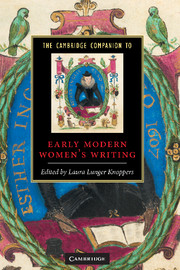Book contents
19 - Prose fiction
from Part III - Genres and modes
Published online by Cambridge University Press: 28 July 2010
Summary
'It is impossible to say when women began to write fiction', Elaine Showalter mused in 1977, then proposed that a novelistic 'literature of their own' could be traced 'from about 1750 on'. Even as Showalter cautioned against generalizing from the 'covert solidarity' of Victorian women novelists to a long feminine literary tradition, she assumed that women's fiction writing must have begun with the novel. Since 1977, the recovery of early modern women writers has led us all to rewrite our literary histories, but prose fiction still remains the genre of early modern writing in which women's share seems most surprisingly sparse. I would like to recover a fuller sense of early women's participation in fiction writing by offering generous definitions of every term in Showalter's early comment. As recent work has shown, we now count as women writers those who pen in manuscript or anonymously or collaboratively, as well as those who publish in their own names. Writing now includes translation, continuation and imitation as well as original creation. We should also define fiction inclusively, since in this period before the novel coalesced as a genre, the variety of imaginative prose writing exceeded any extant generic vocabulary. These more comprehensive definitions embrace literary strategies and practices that were not unique to women-authored fiction, but were the conditions of production of all early modern fiction. Indeed, women-authored fiction, although statistically rare, was crucial in enlarging the scope of a genre the period considered marginal. Precisely because women had to approach writing fiction with double caution, both gendered and generic, they articulated unusually subtle claims for the artistic, ethical and political seriousness of imaginative prose.
- Type
- Chapter
- Information
- The Cambridge Companion to Early Modern Women's Writing , pp. 272 - 286Publisher: Cambridge University PressPrint publication year: 2009
- 2
- Cited by



